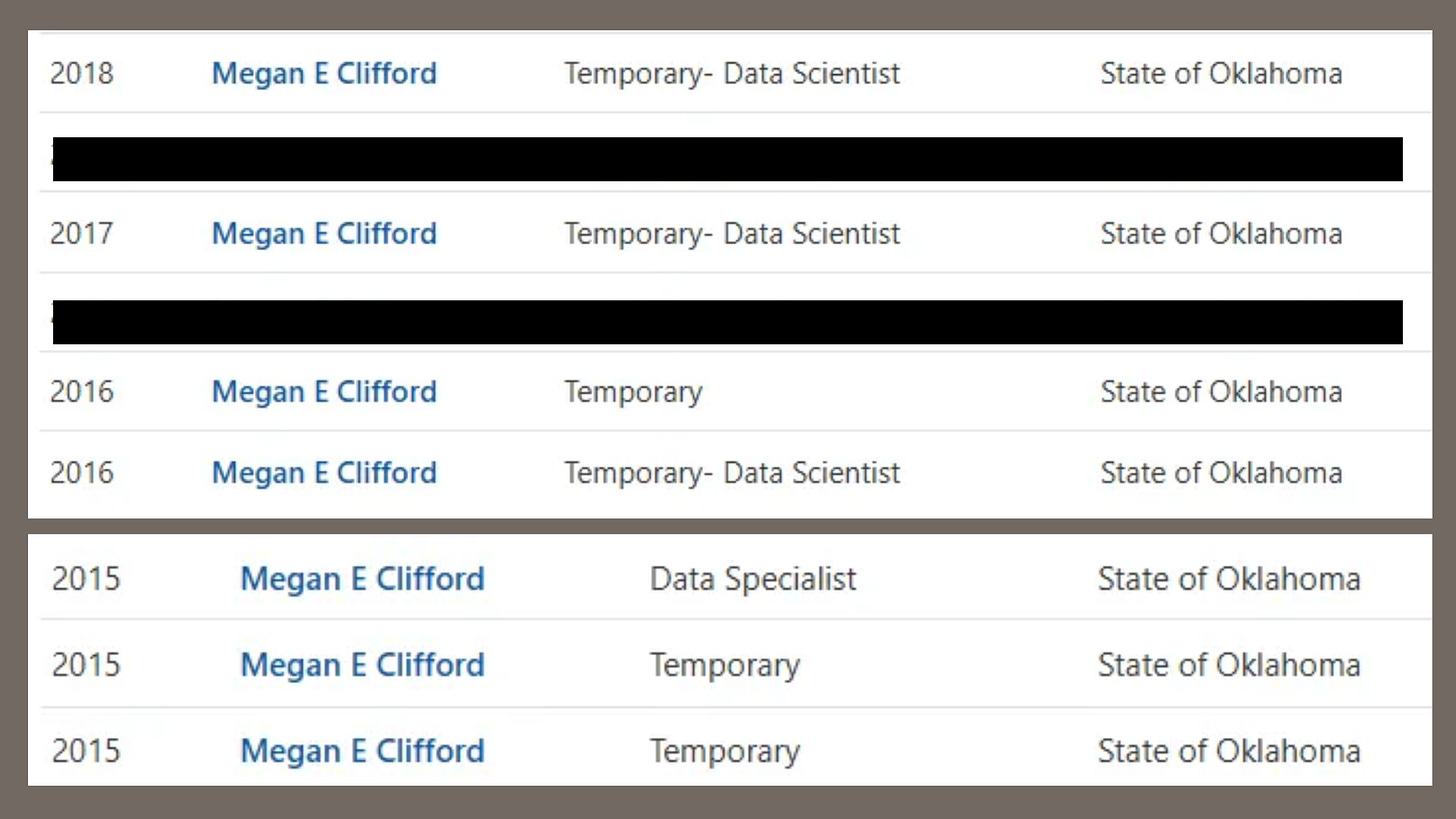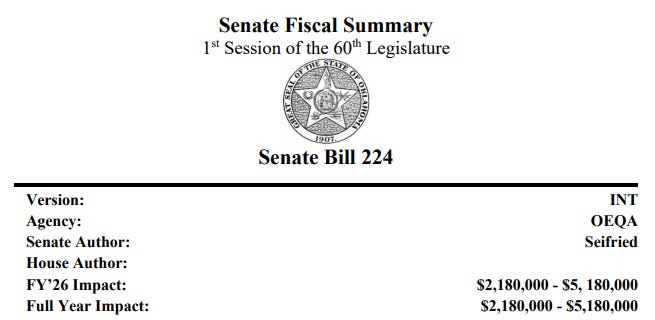OEQA Will Hold Oklahomans' Lifelong Data Under SB 224: Why You Should Be Concerned
House Speaker Hilbert Defies Chamber Rules to Keep SB 224 Alive
Senate Bill 224 (SB 224) is the most controversial within Oklahoma’s current legislative session. Under the guise of workforce development, it will establish a massive database full of information on every Oklahoma child and their parents/caregivers, from cradle to career:
“There is hereby created the Oklahoma Education and Workforce Efficiency Data System (EDS) as a secure system for the deidentification, exchange, and matching of education and workforce data among approved entities.” - SB 224
A large number of grassroot groups representing the will of Oklahomans are firmly opposed and see SB 224 as part of a much longer and wider plan to grow government power and threaten individual freedoms. See previous reporting:
33 Grassroots Orgs Unite to Fight SB 224: UniParty Legislators Seek to Grow Govt, Expense, Grift & PK-12 Data Collection
·On Monday, a group of 29 organizations and notable figures in the fight to protect the individual rights and freedoms of Oklahoma families released a joint statement condemning SB 224.
House Speaker Hilbert Breaks Chamber Rules to Save SB 224
UniParty leaders within both the State House and Senate have remained fiercely determined to make SB 224 law, boldly defying House voting rules after the bill failed multiple times.
On May 1, 2025, after SB 224 failed its final floor vote, House Speaker Kyle Hilbert (R-Bristow) called for yet another vote in violation of House rules. Concerningly, the just failed bill then passed with 51 votes. Grassroots groups quickly called out the vote flippers and unethical proceedings.

In his recent article, Jason Murphy, state legislator turned political journalist, provided an insider’s perspective on how procedurally taboo Hilbert’s extra vote was and what it will do to already lagging voter trust in Oklahoma’s legislature.
It is unknown what strongarming by text, threats of a Republican primary challenger next year or legislator chess may have occurred during the seven (7) minutes that flipped the required number of votes from “Nays” to “Yeas”. The bill has now been retitled and sent back to the Senate for another final vote.
Rep Tom Gann (R) concisely explains the origins of SB 224 and why every Oklahoman should be pushing back. This is a short, MUST LISTEN video.
Why Worry About SB 224? Bill Tells on Itself
The broad assurances of SB 224 authors Rep Chad Caldwell (R) and Sen Ally Seifried (R-Claremore) promising EDS data will be limited, will not be unnecessarily shared and will be de-identified to protect individuals are clearly contradicted within the language of SB 224.
Ironically, Seifried campaigned to “defend Oklahoma from government overreach” and “fight for liberty”.

Caldwell is a lame duck representative who joined Governor Stitt and twenty (20) other Oklahoma lawmakers in endorsing Florida Governor Ron Desantis (R) over Donald Trump in the 2024 Republican presidential primary. V1SUT reached out to both Seified and Caldwell with questions about SB 224 in April. Neither responded.
Everything about SB 224 allows a newly created and expensive government entity to expand at will and permit an unlimited number of new entities, both public and private, to access Oklahomans’ educational and employment data.
The bill creates a nine (9) member Efficiency Data System Governance Council to “oversee all aspects of data governance including approving data access policies, privacy standards, and data-sharing agreements”. This council is largely pre-filled with state government bureaucrats and can expand to include an unlimited number of “additional state agencies, institutions of higher education, or stakeholder groups as needed” and create “committees” as it sees fit. It can also allow EDS “access to approved external partners including researchers or vendors”.
As for what data goes into the EDS, the new government council will “identify and prioritize critical data elements and datasets for initial integration in the system” and “outline a process to approve and onboard new agencies to the EDS”. There are no limits to how many new agencies can be added to the system and few restrictions concerning future data points that may be collected from those agencies.
The system will also be allowed to collect database fees from approved entities, a serious incentive for allowing greater access and growing a well funded, government mini-kingdom.
The bill calls for the council to “select a vendor for the development and maintenance of the EDS”. During April, bill author Caldwell reportedly told concerned constituents a vendor had already been identified for that work. Such a selection at this stage would represent a breach of the state’s contracting process and requirements. Oklahomans can reasonably expect that vendor to have lobbyists.
The bill gives “funding and procurement responsibilities…to the Commission for Educational Quality and Accountability (OEQA), with the EDS housed within the Office of Educational Quality and Accountability.”
The OEQA is the previous government agency created, in 2014, by very similar state legislation (2012 SB 1797) to improve Oklahoma’s educational quality. Student assessment scores promptly took a nosedive from 2015-2019, prior to Covid interruptions. By 2019, Oklahoma ranked 49th on Education Weekly’s quality report.
If SB 224 becomes law, the OEQA will be both physically and fiscally expanded at taxpayer expense. In her comments within a legislative committee meeting regarding SB 224, OEQA Executive Director Megan Oftedal said a new position would be created to oversee the EDS at a cost of $85,000 in FY26 and an annual salary of $350K in FY27. Oklahomans should not be surprised if a legislator who recently or will soon be reaching term limits lands in that chair.
Taxpayers Paid OEQA Lobbied for Its Own Expansion
Within Oftedal’s FY26 budget presentation for OEQA, the agency lists promotion of the SB224 data system, then called the Advanced Statewide Longitudinal Data System (SLDS), as a primary goal and accomplishment of the agency:
“Advanced Statewide Longitudinal Data System (SLDS): OEQA worked collaboratively with SDE, Regents, OESC, and CareerTech to advance the development of a Statewide Longitudinal Data System (SLDS). Efforts included securing legislative sponsorship, convening a multi-agency working group, and obtaining federal funding to send a 5-agency contingent to a national SLDS workshop.”
The Oklahoma Ethics Commission lists OEQA’s Oftedal as an active lobbyist and legislative liaison for the agency. Why does a government agency like OEQA need a lobbyist? Taxpayer funded, government employed lobbyists push agency expansion bills like SB 224 that most Oklahomans would logically oppose. In 2024, Oftedal was paid an annual salary of $132,946.
Oftedal’s budget presentation also revealed OEQA is responsible for taxpayer funded subscriptions totally $350,000 to highly progressive, national organizations such as the USAID-linked SREB. SB 224 author Caldwell and Sen Adam Pugh (R) are Oklahoma’s two (2) representatives on the SREB’s Legislative Advisory Council. See previous reporting:
OK Gov Stitt, Sen Pugh, Rep Caldwell Serve USAID Linked Education NGO, Send OK Tax Dollars Out-of-State for DEI
·Despite Oklahoma being the reddest state, with all 77 counties delivering a win for President Trump last November, it’s state leaders regularly remove their self-applied public labels of “Conservative”, “Republican” and “MAGA” once the cameras are off.
Supt Ryan Walters Sets Record Straight: SDE Neutral, Never Publicly Supported SB 224
During committee hearings, Caldwell claimed the SDE under State Superintendent Ryan Walters’ (R) supports SB 224. We reached out to Supt Walters who will not be signing a letter of support for SB 224 that is rumored to be circulating and asserted his agency’s neutrality concerning the bill.
“I have never publicly supported the bill. Not sure where that would be coming from,” said State Supt Ryan Walters of SB224. “SDE has always been neutral on the bill. We are required to provide data to legislators when they request it.”
OEQA’s claims of having “worked collaboratively with SDE, Regents, OESC, and CareerTech to advance the development of a Statewide Longitudinal Data System (SLDS)” are also exaggerated.
When asked if he had personally attended any meetings with any OEQA personnel concerning SB 224 or a centralized database over the last year, Walters replied, “No, I was not personally involved in that.”
SB 224 was an OEQA push, reportedly fueled by the State and Oklahoma City Chambers of Commerce, and it appears the SDE was never involved. Concerningly, a Title 70 bill (all things education) did not involve the only elected, state-level official over public education.
Growing Government That Works Against the People: OEQA Exec Director’s Revealing Resume Omission
There are no elected officials at the OEQA. Executive Director Megan Oftedal’s LinkedIn resume lists her jumps from the global policy influencing Rand Corporation to other concerning employers, including $419.5 million election meddler Mark Zuckerberg’s Meta, but omits a professional experience that overlaps a major scandal and indictments where Oklahoma education and politics meet.

In 2013, after attending the left-leaning graduate school that is an extension of the Rand Corporation, Megan Oftedal (then Megan Clifford) came to Oklahoma as a Strategic Data Fellow within Harvard University’s Center for Education Policy Research. Due to radically progressive policies and continued antisemitic activity on its campus, the Trump administration recently threatened Harvard’s tax exempt status.
Like other such Harvard fellows sent to state education agencies nationwide, Oftedal was embedded within the Oklahoma State Department of Education (SDE). Her hire date at the SDE is listed within public records as August 15, 2013.

At the end of her fellowship in 2015, Oftedal’s resume says she worked as a Senior Data Analyst for school insurance giant American Fidelity (2015-2021) out of Oklahoma City. She was married in 2016 and legally changed her last name from Clifford to Oftedal in 2018.

What her resume doesn’t reveal is that from 2015 until 2018, Oftedal continued to perform work for both the SDE and the Office of State Finance (now known as OMES) as a now paid “temporary” data scientist while simultaneously leading American Fidelity’s data science team. From 2015 until 2018, Oftedal (Clifford) was paid $21,096 by the SDE and $77,379 by OMES.

The overlap in Clifford’s work for then State Superintendent Joy Hofmeister (R then D) at the SDE and American Fidelity are of particular interest. In 2014, Hofmeister and American Fidelity Assurance Company had engaged in a dark money, campaign finance partnership that would lead to the 2016 indictments of Hofmeister, teachers’ union director Lela Owens (OEA), school administrators’ union director Steven Crawford (CCOSA) and political consultants Stephanie Dawn Milligan and Robert “Fount” Holland.

In 2012, education NGOs and consultants illegally coordinated with Hofmeister to fund the dark money entity Oklahomans for Public School Excellence (OPSE) with American Fidelity money. From previous reporting:
During April of 2014, American Fidelity, an insurance group that had been working closely with the teachers’ union for fifty years to push its income protection policy to the state’s teachers, wrote two $50,000 checks and funneled them through the OEA and CCOSA. The unions held the money until the non-profit IE (OPSE) was officially formed, each adding another $100,000, for a total of $300,000 just waiting to make a media buy of ads trashing Barresi (then incumbent State Superintendent).
The misdeeds of Hofmeister and her co-conspirators were quietly dismissed by then Oklahoma County DA David Prater (D). Oftedal was working behind the scenes at the SDE both during and after those crimes and joined American Fidelity shortly before the indictments.
Oftedal took the lead position at OEQA in 2023, and if SB 224 is bullied through the Senate, will oversee the collection and release of Oklahomans’ educational and employment data.
If you don’t trust the government with your data or think something (or everything) about SB 224 smells just not right, reach out to your State Senator before the final vote…unless, like the State House vote, the final vote isn’t actually the final vote.
Have a tip or information you’d like to share? Comment publicly to this post or email privately (connect@v1sut.com).
Copyright Notice: Individual readers are encouraged to share this original content. Others, including publications, aggregators and social media outlets not operating as an individual must request and receive written permission from The V1SUT Vantage before using this content in whole or in part. Email connect@V1SUT.com to request permission.










